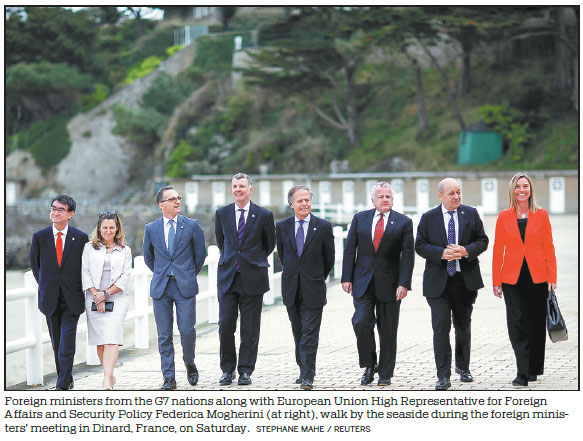G7 talks 'constructive', although disputes on two key issues remain
DINARD, France - The Group of Seven nations ended a foreign ministers' meeting in western France without quarreling on Saturday, as they looked to lay the groundwork for a leaders' summit in August despite the absence of the US Secretary of State, Reuters reported.
US President Donald Trump had thrown last year's summit of the club of major industrial countries in Canada into disarray, backing out of a joint communique and firing barbs at Prime Minister Justin Trudeau.
France, which now has the G7 presidency, scaled back its ambitions for the latest meeting, focusing on areas where consensus could be found including the dangers of cyber crime for democracy, tackling inequalities between men and women, and trafficking in Africa's Sahel region.
"Last year there was an end of G7 that did not go very well but the G7 here in Dinard went very well," France's Foreign Minister Jean-Yves Le Drian told reporters, seeking to put a positive spin on the two-day meeting.
"Despite the crisp air of Dinard, we couldn't overcome some of our differences. I think the talks were constructive and pleasant both in tone and in the fundamentals," Xinhua News Agency quoted Le Drian as saying.
The meeting was overshadowed by the absence of Pompeo, who sent his deputy in his place. One diplomat said it sent a message that he "had better things to do".
Key issues
Despite that unity, Le Drian pointed out that differences on key issues were still evident, especially on the Israeli-Palestinian conflict and how to handle Iran.
"We wanted to be completely transparent and say that on two topics in particular - the Israeli-Palestinian conflict and the way to follow regarding relations with Iran - we have divergences that are known," he said.
A spokeswoman for Japan's foreign ministry described the debate as friendly but at times heated and frank.
Trump last year pulled the United States out of Iranian international nuclear deal, rejecting the approach favored by Washington's allies to curb Teheran's nuclear ambitions.
The final communique made no mention of the Iran accord, which France, Britain and Germany continue to abide by. However, it outlined concerns over Iran's regional and ballistic missile activities, and its human rights record.
"We intend to continue our work to counter Iran's regional proliferation of ballistic missiles and its unlawful arms transfers," the communique said.
The biggest difference was on the Israeli-Palestinian conflict. In March, Trump recognized Israel's 1981 annexation of the Golan Heights in an election boost for Israeli Prime Minister Benjamin Netanyahu, drawing direct or implied criticism from the European Union and European capitals.
"We had an exchange of views on the Israeli-Palestinian conflict and there were clear differences," the communique read.
G7 leaders will meet in southwest France at the end of August.

(China Daily 04/08/2019 page12)














